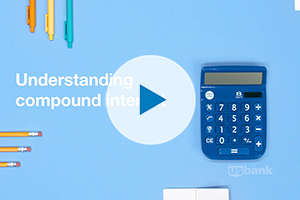
How compound interest works

Talent acquisition 101: Building a small business dream team

Taking out loans for college is a reality for many students. Perhaps you’ve just been accepted to your top-choice university and you’re wondering how to finance it, or maybe your degree is nearly complete and it’s time to start thinking about repayment. No matter where you are in your pursuit of higher education, it’s important to understand your student loans and how they impact your financial future. From A to Z, here are the phrases you’re likely to come across in your loan agreement.
Neglecting to make your loan payments in accordance with your contract that outlines the terms and conditions of your loans. Depending on the type of loan, it could go into default as soon as you miss one payment. Others may be considered in default after nine months of non-payment.
The ability to stop making payments on federal loans for a short period of time. This could apply if you’re enrolled in school, unable to find full-time employment, serving in the military or experiencing economic hardship. You may not have to pay the accrued interest on your loans during this time.
A person, perhaps a parent or other relative, with good credit history who agrees to repay your student loans if you’re not able to.
This determines your eligibility for financial aid and is calculated based on the information provided on your Free Application for Federal Student Aid (FAFSA).
Similar to deferment in that it allows those who are eligible to temporarily cease making payments because of reasons such as change in employment, financial difficulties or medical expenses. Unlike deferment, however, you are responsible for paying the interest that accrues during your forbearance period.
A period of time after a borrower graduates, leaves school or drops below half-time enrollment where he or she is not expected to make payments on student loans. A typical grace period is six to nine months.
Sometimes referred to as discharge or cancellation, this is the dismissal of the borrower’s obligation to repay an outstanding student loan. Forgiveness is granted in limited circumstances, such as working for a government agency or nonprofit organization, bankruptcy or death.
The document you sign in which you promise to repay your student loans. This is a contract that outlines the terms and conditions of your loans.
The maximum amount of time you have to repay your student loans. This typically ranges from 10 to 30 years, depending on your loan amount and repayment plan.
A plan you agree to with a lender to repay your student loans. The type of plan you choose will determine your monthly payment amount and how many payments you ultimately make. Your options include:
A federal student loan, the amount of which is determined by your school and cannot exceed your financial need. Interest is paid by the U.S. Department of Education while you're in school, during your grace period and during deferment.
Available to all students, regardless of financial need, though your school still determines the amount you can borrow. You are responsible for paying interest during all periods of this type of loan.
Get more tips and information to help you understand what your options may be to help you pay for a college education.


